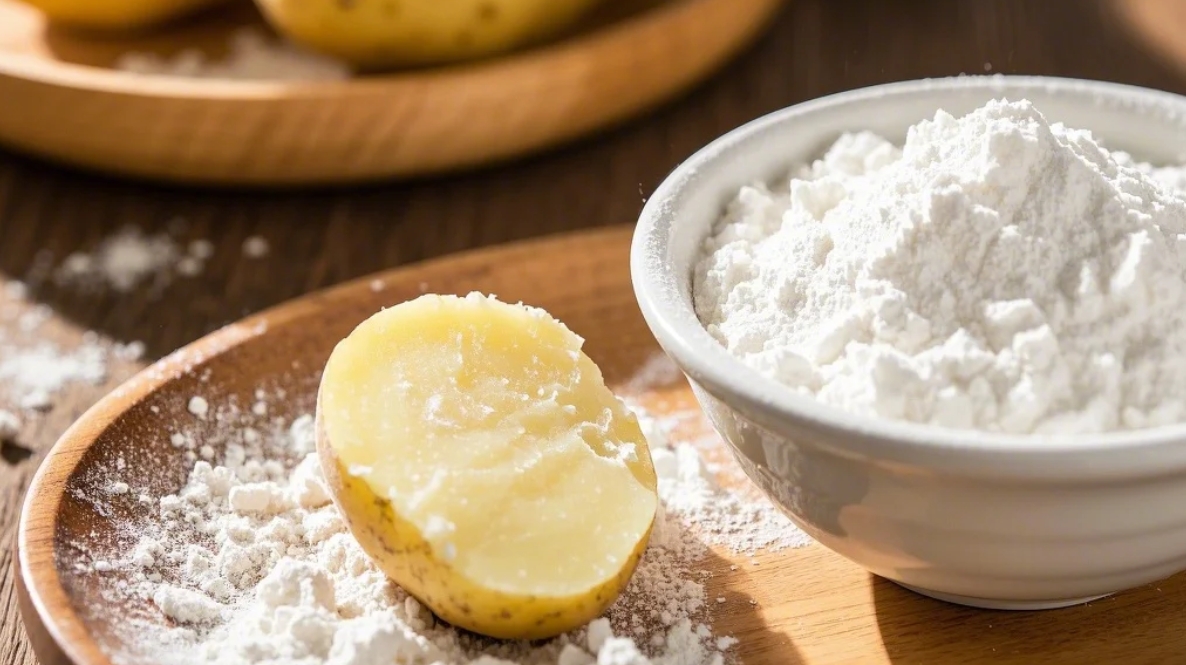From Farm to Fork, Redefining Clean Ingredients
In an era where consumers demand transparency and sustainability, organic potato starch has emerged as a cornerstone of clean-label innovation. Sourced from non-GMO potatoes grown without synthetic pesticides or chemical fertilizers, this plant-based marvel is transforming kitchens, food manufacturing, and even personal care products. With the global organic starch market projected to grow at 7.8% CAGR through 2030 (Grand View Research), it’s time to explore how this humble ingredient is making a mighty impact.

1. What is Organic Potato Starch?
1.1 The Science of Simplicity
Potato starch is extracted from the tubers of potatoes through a gentle process of washing, crushing, and drying. When certified organic, it ensures:
- Non-GMO Farming: Potatoes grown using regenerative agriculture practices.
- Chemical-Free Processing: No synthetic additives, bleach, or sulfur dioxide.
- Certifications: USDA Organic, EU Organic, Kosher, Halal, and Gluten-Free.
1.2 Key Properties
- Neutral Taste & Odor: Lets natural flavors shine.
- High Purity: 99% starch content, free from gluten, grains, and allergens.
- Superior Thickening: Forms a smooth, glossy texture without clumping.
2. Why Choose Organic Over Conventional?
| Criteria | Conventional Potato Starch | Organic Potato Starch |
|---|---|---|
| Raw Material | Risk of pesticide residues | Grown without synthetic chemicals |
| Processing | May use chemical bleaches | Physical methods, no harsh additives |
| Nutrition | Lower nutrient retention | Preserves natural potato micronutrients |
| Sustainability | High water/energy use | Closed-loop water systems, organic waste composted |
3. Health & Functional Benefits
3.1 Dietary Inclusivity
- Gluten-Free: Safe for celiac and gluten-sensitive individuals.
- Low Allergen Risk: Free from grains, nuts, and soy—ideal for allergen-friendly recipes.
3.2 Digestive Wellness
- Resistant Starch: Acts as a prebiotic, feeding beneficial gut bacteria (Nutrition Journal, 2023).
- Gentle on Stomach: Easier to digest than corn or wheat starch for sensitive systems.
3.3 Culinary Performance
- Heat Tolerance: Withstands freezing and reheating without breaking down.
- Clear Gel Formation: Perfect for glossy sauces, soups, and vegan desserts.
4. Industry Applications: Beyond the Kitchen
4.1 Food & Beverage Innovation
- Plant-Based Foods: Binds moisture in vegan burgers and gluten-free baked goods.
- Clean-Label Sauces: Replaces modified starches in organic ketchup and dressings.
- Baby Food: Safe thickener for hypoallergenic purees and formulas.
4.2 Personal Care & Pharma
- Natural Cosmetics: Used in talc-free powders and lotions for silky texture.
- Tablet Binding: Acts as a disintegrant in organic supplements.
4.3 Sustainable Packaging
- Biodegradable Films: Combined with chitosan for compostable food wraps.
5. Sustainability: Rooted in Regeneration
- Soil Health: Organic potato farms increase microbial diversity by 40% (Rodale Institute).
- Zero Waste: Potato peels and pulp upcycled into animal feed or biogas.
- Carbon Footprint: 25% lower emissions vs. conventional starch (LCA data).
6. How to Use: Tips for Success
6.1 Culinary Pro Tips
- Sauces & Gravies: Mix 1 tbsp starch with 2 tbsp cold water, then stir into hot liquids.
- Baking: Substitute 1:1 for cornstarch in gluten-free recipes.
- Crispy Coatings: Toss tofu or veggies in starch before air-frying for crunch.
6.2 Industrial Formulation
- Optimal Concentration: 2–5% in soups, 3–8% in plant-based cheeses.
- Synergistic Blends: Pair with guar gum for enhanced viscosity.
6.3 Storage
- Keep in airtight containers away from moisture (shelf life: 18–24 months).
7. Success Stories
7.1 “GreenCrunch” Vegan Cheese
- Challenge: Replace synthetic thickeners in organic cashew cheese.
- Solution: Organic potato starch + coconut oil for meltable texture.
- Result: 2023 Best Plant-Based Product at Plant Based World Expo.
7.2 “PureBaby” Organic Formula
- Innovation: Used potato starch to thicken hypoallergenic rice cereal.
- Impact: Reduced parental complaints about digestive issues by 60%.
8. The Future: Innovations on the Horizon
- Functional Blends: Prebiotic-resistant starch + probiotics for gut health snacks.
- Carbon-Negative Production: Solar-powered starch extraction facilities (2025 pilot).
Conclusion: The Unsung Hero of Clean-Label Formulation
Organic potato starch isn’t just a thickener—it’s a testament to the power of simplicity. From enhancing plant-based foods to supporting sustainable agriculture, it bridges the gap between functionality and ethics. For brands committed to purity, inclusivity, and planetary health, this ingredient is a recipe for success.